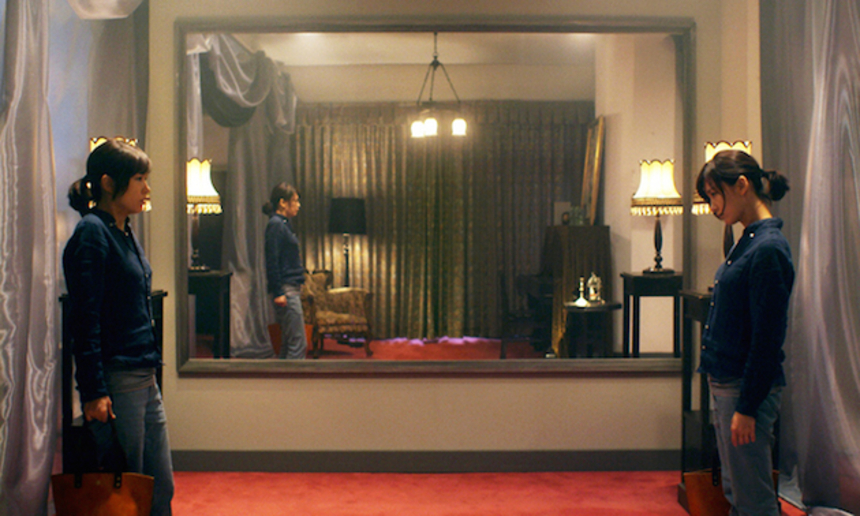Udine 2014 Review: BILOCATION, A Surprisingly Intriguing But Messy Psycho-Thriller

Japanese horror films have always loved to play with ancient legends and urban myths, most of which obviously have to do with ghosts, but recent attempts at revamping the genre proved to be mildly successful at best. Fortunately, Asato Mari seems to be perfectly aware of the fact that such concepts don't attract much attention anymore. As a result, Bilocation has zero ghosts, but plenty of doppelgangers who roam around Tokyo damaging the mental and physical health of their "originals". Undoubtedly, at some point it brings to mind Kurosawa Kiyoshi's Doppelganger but, unlike Kurosawa's darkly funny picture, Bilocation tries its best to stay serious while contemplating a similarly provocative idea.
Front and center of the fantastical story is Kirimura Shinobu (Mizukawa Asami), an aspiring painter living in a standard apartment complex in one of the quieter districts of the great metropolis. The opening scene pictures her struggling with a painting, but a repeated doorbell quickly interrupts the woman's artistic breakdown. She opens the door and sees a young blind man who's just moved in and came to say hello. Fast-forward a couple of months and Shinobu is seen sitting at a table in an apartment exactly a floor below her old residence, explaining in a voice-over that the occasional neighbor is now her husband.
Shinobu's seemingly peaceful life starts turning into a dreadful nightmare after a cashier at a local store accuses her of paying with fake bills. A detective (Takito Kenichi) responsible for the case then takes her to a gothic horror-like mansion, filled with the usual creepy dolls and dimly lit rooms, and reveals that she's one of the few people cursed -- or blessed, depending where one comes from -- with bilocation.
Generally caused by a storm of mixed emotions, that rare ability becomes the direct cause of the appearance of an alter ego. Prone to aggressive behavior, this otherworldly creature with a specific eye defect is characterized by having no reflection in the mirror.
Shinobu is introduced to other people coping with the same horrible situation: an exhausted woman with a very sick son (Sakai Wakana), the above-mentioned investigator, who's constantly humiliated by his boss, and a university student (J-pop superstar Senga Kento), whose history is hardly explained. Their mutual plan is to get rid of the duplicates as soon as possible, however, things get complicated when alter egos get minds of their own and try to protect themselves with violence.
The perfectly workable horror concept inevitably turns into an overcomplicated, albeit innovative psychological scenario. Bilocation meanders between opposites sides of a "bairoke"-infested (that's how the characters call their doubles) equation constantly shifting its viewpoint in order to puzzle the viewer, but the effect is ultimately more exhausting than stimulating. The endeavor to defeat evil doppelgangers loses its credibility when the film's mind-boggling aspirations deviate the course of action onto Shinobu and her struggle with feelings and the concept of the "self", leaving all the other characters in the background.
It's crucial to notice that Asato cast two inexperienced but hugely beloved teen pop sensations to play opposite the seasoned actors, obviously a trick meant to encourage younger crowds to see the film. Apart from Senga there's also Takada Sho, who plays an enigmatic outcast surprisingly hiding his pretty face behind a woolen scarf. Their limited screen time and debatable skills probably won't be a big problem for fans.
Given the weight of her role, Mizukawa doesn't really show enough emotional engagement to support the film's unforeseen love-related concept. Then again, due to the course of action, she's supposed to be more confused than the audience, and her facial expression, while largely changeless, confirms that in a satisfactory way.
While chilling and moody, in terms of visuals and atmosphere Bilocation doesn't really stand out in a crowd of J-horrors, but what's definitely the film's advantage is that it doesn't copy any of the redundant techniques and sets its psychological divagations above creepy imagery. Though unnecessarily overplotted, Bilocation shows potential in its horror-with-love-theme storyline and, even if it ponders topics like the meaning of identity and choosing one's own path haphazardly, still gives enough to think about, even before the credits start rolling.
Bilocation
Director(s)
- Mari Asato
Writer(s)
- Haruka Hôjô (based on the novel by)
- Mari Asato (screenplay)
Cast
- Asami Mizukawa
- Yôsuke Asari
- Chûkichi Kubo
- Maiko

Do you feel this content is inappropriate or infringes upon your rights? Click here to report it, or see our DMCA policy.






